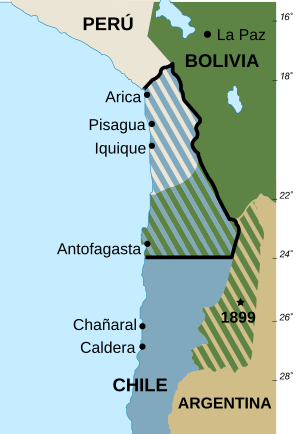War of the Pacific facts for kids
The War of the Pacific (also called the Saltpeter War) happened between 1879 and 1883. It was a fight between Bolivia and Peru on one side, and Chile on the other. The main reason for the war was a disagreement over who controlled a part of the Pacific coast.
This area was in the Atacama Desert. It had many valuable minerals, especially a substance called potassium nitrate (also known as saltpeter). Chilean companies and British businesses were mining these resources. The Bolivian government decided to raise taxes on these companies. This led to a big argument about trade and money, which then started the war.
After the war, Bolivia lost its land along the ocean. This meant Bolivia became a landlocked country, with no direct access to the sea.
Contents
What Was the War of the Pacific?
The War of the Pacific was a major conflict in South America. It lasted for four years, from 1879 to 1883. The war involved three countries: Bolivia, Peru, and Chile. It is sometimes called the Saltpeter War because of the valuable mineral that caused the dispute.
Why Did the War Happen?
The main cause of the war was control over the Atacama Desert. This desert region, located between the 23rd and 26th parallels, was rich in valuable minerals. The most important mineral was potassium nitrate, also known as saltpeter. This mineral was used to make fertilizers and explosives.
Chilean companies and British investors were actively mining these resources. Bolivia, which controlled part of this land, wanted to get more money from the mining. So, the Bolivian government decided to increase the taxes on these companies. Chile disagreed with this tax increase, leading to a big argument. This argument quickly grew into a war.
What Was the Result of the War?
The War of the Pacific had a huge impact on the countries involved. The biggest change was for Bolivia. After the war, Bolivia lost all its land along the Pacific coast. This meant Bolivia no longer had direct access to the ocean. It became a landlocked country, meaning it is surrounded by land on all sides. Chile gained a lot of territory from both Bolivia and Peru.
Images for kids
-
All territorial claims by Chile in 1879
-
A metallic brass cartridge for a Fusil Gras mle 1874 and a paper cartridge for a Chassepot rifle. The brass cartridge avoided the smoke and ashes of the self-consuming paper cartridge.
See also
 In Spanish: Guerra del Pacífico para niños
In Spanish: Guerra del Pacífico para niños
 | Lonnie Johnson |
 | Granville Woods |
 | Lewis Howard Latimer |
 | James West |











